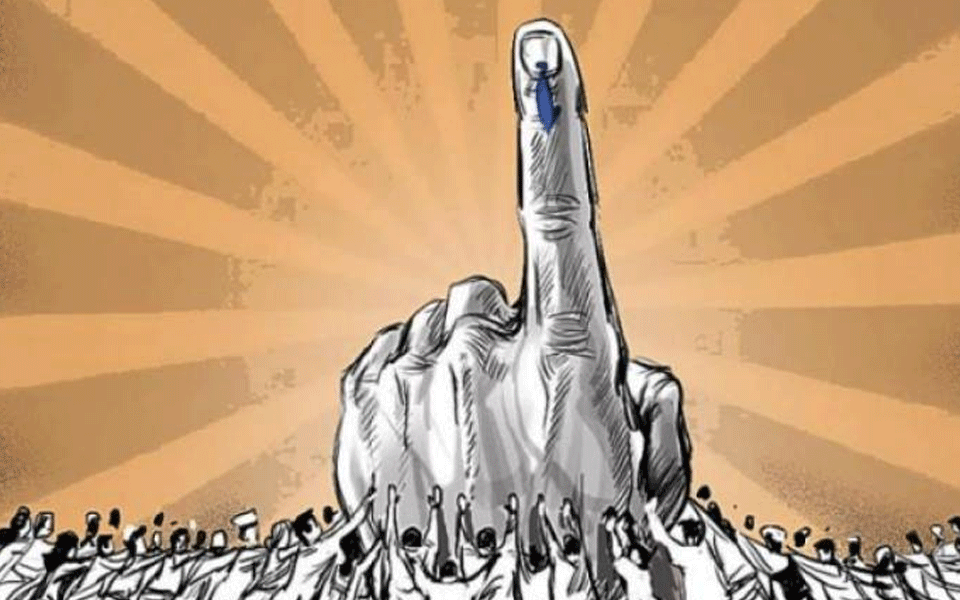Bengaluru, November 2: The voting for the by-election to three Lok Sabha and two Assembly constituencies in the state would be held on November 3 from 7 am and the Election Commission has made all preparation for conducting smooth and fair election.
The by-election which is considered as the referendum for the forthcoming Lok Sabha election, created a tough fight between Congress-JDS and opposition BJP and tried to woo the voters in their own way.
The voter would seal the fate of candidates VS Ugrappa, J Shanta, Madhu Bangarappa, BY Raghavendra, LR Shivarame Gowda, Dr Siddaramaiah, Anitha Kumaraswamy, Anand Nyama Gowda and Srikanth Kulkarni in the EVMs on November 3.
Total 6453 polling booths including 57 pink polling stations in Ballary, Shivamogga, Mandya, Ramanagara and Jamakhandi constituencies and 1502 sensitive polling stations were set up. Along with the local police, 39 platoons of central reserve police force were deployed for the duty.
Total 9822 ballot units, 8438 control units and 8922 VVPAT machines were being used for the voting and web-casting would be done in 130 polling stations and 1312 micro observers were appointed, the Election Commission said.
Total 54.54 lakh voters including 27.21 lakh male and 27.30 female voters would cast their votes in five constituencies. For the first time, vehicle facility was made for physically disabled voters to come to polling stations and vote.
Drilling for winning
In order to woo the electorate, the candidates, local leaders have been visiting the houses in the last day of campaigning. They have also been trying to woo the voters in the last moment with all means. Following possible distribution of money and liquor by the candidates, the Election Commission is keeping a strict vigil on the activities of the political leaders and took many people who tried to distribute money and liquor to the voters into custody.
As Ramanagara BJP candidate Chandrashekar backtracked from the election in the last moment, the BJP has planned to knock the Election Commission to postpone the election in Ramanagara.
The Election Commission has already banned sales of liquor in all the five constituencies and imposed prohibitory orders under Section 144. The counting of votes would be held at respective constituencies on November 6 and the result would be announced on the same day.
“The Election Commission will apply indelible ink on the pointing finger of the left arm in three Lok Sabha and two Assembly by-elections to be held on November 3”.
- Sanjeev Kumar, Chief Election Commissioner
Let the Truth be known. If you read VB and like VB, please be a VB Supporter and Help us deliver the Truth to one and all.
Panaji (PTI): As part of a crackdown against tourist establishments violating laws and safety norms in the aftermath of the Arpora fire tragedy, Goa authorities on Saturday sealed a renowned club at Vagator and revoked the fire department NOC of another club.
Cafe CO2 Goa, located on a cliff overlooking the Arabian Sea at Vagator beach in North Goa, was sealed. The move came two days after Goya Club, also in Vagator, was shut down for alleged violations of rules.
Elsewhere, campaigning for local body polls, AAP leader Arvind Kejriwal said the fire incident at Birch by Romeo Lane nightclub at Arpora, which claimed 25 lives on December 6, happened because the BJP government in the state was corrupt.
An inspection of Cafe CO2 Goa by a state government-appointed team revealed that the establishment, with a seating capacity of 250, did not possess a no-objection certificate (NOC) of the Fire and Emergency Services Department. The club, which sits atop Ozrant Cliff, also did not have structural stability, the team found.
The Fire and Emergency Services on Saturday also revoked the NOC issued to Diaz Pool Club and Bar at Anjuna as the fire extinguishers installed in the establishment were found to be inadequate, said divisional fire officer Shripad Gawas.
A notice was issued to Nitin Wadhwa, the partner of the club, he said in the order.
Campaigning at Chimbel village near Panaji in support of his party's Zilla Panchayat election candidate, Aam Aadmi Party leader Kejriwal said the nightclub fire at Arpora happened because of the "corruption of the Pramod Sawant-led state government."
"Why this fire incident happened? I read in the newspapers that the nightclub had no occupancy certificate, no building licence, no excise licence, no construction licence or trade licence. The entire club was illegal but still it was going on," he said.
"How could it go on? Couldn't Pramod Sawant or anyone else see it? I was told that hafta (bribe) was being paid," the former Delhi chief minister said.
A person can not work without bribing officials in the coastal state, Kejriwal said, alleging that officers, MLAs and even ministers are accepting bribes.





